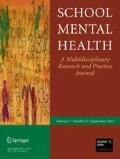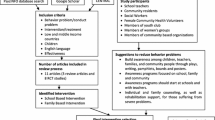Abstract
In a pre–post design study, we examined the effectiveness and sustainability of a school mental health program for youth with or at-risk for ADHD (n = 41) when implemented over the course of 4 years by district-employed school mental health professionals (SMHPs) in a rural community. In the program, children received a daily report card (DRC) intervention and teachers received behavioral consultation sessions twice a month. Parent and teacher ratings of symptoms and impairment were collected at pre-intervention (typically fall) and post-intervention (spring) of each academic year. According to parent ratings, children experienced significant improvement in academic functioning (effect size (ES) = .65) and overall functioning (ES = .57). Changes in parent-rated symptoms were in the expected direction, but small in magnitude (ranged from .22 to .32) and nonsignificant. Changes in teacher ratings of symptoms and impairment were nonsignificant. The ESs ranged from −.12 (self-esteem) to .42 (inattention). Results are discussed in the context of current efforts to disseminate treatments for youth with ADHD and disruptive behavior disorders.
Similar content being viewed by others
References
Atkins, M. S., Frazier, S. L., Birman, D., Adil, J. A., Jackson, M., Graczyk, P. A., et al. (2006). School-based mental health services for children living in high poverty urban communities. Administration and Policy in Mental Health and Mental Health Services Research, 33(2), 146–159. doi:10.1007/s10488-006-0031-9.
Atkins, M. S., Pelham, W. E., & Licht, M. H. (1985). A comparison of objective classroom measures and teacher ratings of attention deficit disorder. Journal of Abnormal Child Psychology: An official publication of the International Society for Research in Child and Adolescent Psychopathology, 13(1), 155–167. doi:10.1007/BF00918379.
Barkley, R. A. (1997). Defiant children: A clinician’s manual for assessment and parent training (2nd ed.). New York, NY: Guilford Press.
Barkley, R. A., Fischer, M., Smallish, L., & Fletcher, K. (2006). Young adult outcome of hyperactive children: Adaptive functioning in major life activities. Journal of the American Academy of Child and Adolescent Psychiatry, 45(2), 192–202. doi:10.1097/01.chi.0000189134.97436.e2.
Burns, B. J., Costello, J., Angold, A., Tweed, D., Stangl, D., Farmer, M. Z., et al. (1995). Children’s mental health service use across service sectors. Health Affairs, 14(3), 147–159.
Connor-Smith, J. K., & Weisz, J. R. (2003). Applying treatment outcome research in clinical practice: Techniques for adapting interventions to the real world. Child and Adolescent Mental Health, 8, 3–10.
Craske, M. G., Roy-Byrne, P. P., Stein, M. B., Sullivan, G., Sherbourne, C., & Bystritsky, A. (2009). Treatment for anxiety disorders: Efficacy to effectiveness to implementation. Behaviour Research and Therapy, 47(11), 931–937. doi:10.1016/j.brat.2009.07.012.
Cunningham, C. E., Bremner, R., & Secord, M. (1996). COPE: The community parent education program. A school-based family systems oriented workshop for parents of children with disruptive behavior disorders. Hamilton, Canada: COPE Works.
Curtis, N. M., Ronan, K. R., & Borduin, C. M. (2004). Multisystemic treatment: A meta-analysis of outcome studies. Journal of Family Psychology, 18(3), 411–419. doi:10.1037/0893-3200.18.3.411.
DuPaul, G. J., Power, T. J., McGoey, K. E., Ikeda, M. J., & Anastopoulos, A. D. (1998). Reliability and validity of parent and teacher ratings of attention-deficit/hyperactivity disorder symptoms. Journal of Psychoeducational Assessment, 16(1), 55–68. doi:10.1177/073428299801600104.
Evans, S. W., Owens, J. S., Mautone, J. A., DuPaul, G. D., & Power, T. J. (in press). Toward a life course model of ADHD. In M. D. Weist, N. Lever, C. Bradshaw, & J. S. Owens, (Eds.) Handbook of school mental health (2nd Edn). Springer: New York.
Fabiano, G. A., Pelham, W. E., Cole, E. K., Gnagy, E. M., Chronis-Tuscano, A., & O’Connor, B. C. (2009). A meta-analysis of behavioral treatments for attention-deficit/hyperactivity disorder. Clinical Psychology Review, 29(2), 129–140. doi:10.1016/j.cpr.2008.11.001.
Fabiano, G. A., Pelham, W. E., Waschbusch, D. A., Gnagy, E. M., Lahey, B. B., Chronis, A. M., et al. (2006). A practical measure of impairment: Psychometric properties of the impairment rating scale in samples of children with attention deficit hyperactivity disorder and two school-based samples. Journal of Clinical Child and Adolescent Psychology, 35(3), 369–385. doi:10.1207/s15374424jccp3503_3.
Goldsmith, H. F., Wagenfeld, M. O., Manderscheid, R. W., & Stiles, D. (1997). Specialty mental health services in metropolitan and nonmetropolitan areas: 1983 and 1990. Administration and Policy In Mental Health, 24(6), 475–488. doi:10.1007/BF02042826.
Greene, R. W., Beszterczey, S. K., Katzenstein, T., Park, K., & Goring, J. (2002). Are students with ADHD more stressful to teach? Patterns of teacher stress in an elementary school sample. Journal of Emotional and Behavioral Disorders, 10(2), 79–89. doi:10.1177/10634266020100020201.
Hollingshead, A. B. (1975). Four factor index of social status. New Haven, CT: Yale University Department of Sociology.
Hoza, B. (2007). Peer functioning in children with ADHD. Journal of Pediatric Psychology, 32(6), 655–663. doi:10.1093/jpepsy/jsm024.
Individuals with Disabilities Education Improvement Act of 2004, 20 U.S.C.§ 1400 et seq. (2004) (reauthorization of the Individuals with Disabilities Education Act of 1990).
Jensen, L. (2006). At the razor’s edge: Building hope for America’s rural poor. Rural Realities, 1(1). Retrieved June 11, 2012 from http://www.ruralsociology.org/wp-content/uploads/2012/03/Rural-Realities-1-1.pdf.
Kelley, M. L. (1990). School-home notes: Promoting children’s classroom success. New York: Guilford.
Langberg, J. M., Epstein, J. N., Becker, S., Girio-Herrera, E., & Vaughn, A. J. (2012). Evaluation of the homework, organization, and planning skills (HOPS) intervention for middle school students with attention deficit hyperactivity disorder as implemented by school mental health providers. School Psychology Review, 41(3), 342–364.
Langberg, J. M., Vaughn, A. J., Williamson, P., Epstein, J. N., Girio-Herrera, E., & Becker, S. P. (2011). Refinement of an organizational skills intervention for adolescents with ADHD for implementation by school mental health providers. School Mental Health, 3(3), 143–155.
Merikangas, K. R., He, J., Brody, D., Fisher, P. W., Bourdon, K., & Koretz, D. S. (2010). Prevalence and treatment of mental disorders among US children in the 2001–2004 NHANES. Pediatrics, 125(1), 75–81. doi:10.1542/peds.2008-2598.
Mikami, A. Y., Griggs, M. S., Lerner, M. D., Emeh, C. C., Reuland, M. M., Jack, A., & Anthony, M. R. (in press). A randomized trial of a classroom intervention to increase peers’ social inclusion of children with attention-deficit/hyperactivity disorder. Journal of Consulting and Clinical Psychology. doi: 10.1037/a0029654.
National Advisory Mental Health Council Workgroup on Services Research and Clinical Epidemiology. (2006). The road ahead: Research partnership to transform services. Washington, DC: Author.
Owens, J. S., Andrews, N., Collins, J., Griffeth, J. C., & Mahoney, M. (2011). Finding common ground: University research guided by community needs for elementary school-aged youth. In L. Harter, J. Hamel-Lambert, & J. Millesen (Eds.), Participatory partnerships for social action and research (pp. 49–71). Dubuque, IA: Kendall Hunt Publishers.
Owens, J. S., & Fabiano, G. A. (2011). School mental health programing for youth with ADHD: Addressing needs across the academic career. School Mental Health, 3, 111–116. doi:10.1007/s12310-011-9061-x.
Owens, J. S., Girio, E. L., Himawan, L. K., & Abbott, M. Y. (2008a). Implementing and evaluating evidence-based treatments in schools: Successes and lessons learned. Advances in School Mental Health Promotion, 1, 39–51.
Owens, J. S., Holdaway, A. S., Zoromski, A. K., Evans, S. W., & Himawan, L. K., Girio-Herrera, E., & Murphy, C. (2012). Incremental benefits of a daily report card intervention over time for youth with disruptive behavior. Behavior Therapy, 43(4), 848–861. doi:10.1016/j.beth.2012.02.002.
Owens, J. S., Murphy, C. E., Richerson, L., Girio, E. L., & Himawan, L. K. (2008b). Science to practice in underserved communities: The effectiveness of school mental health programming. Journal of Clinical Child and Adolescent Psychology, 37(2), 434–447. doi:10.1080/15374410801955912.
Owens, J. S., Richerson, L., Beilstein, E. A., Crane, A., Murphy, C. E., & Vancouver, J. B. (2005). School-based mental health programming for children with inattentive and disruptive behavior problems: First-year treatment outcome. Journal of Attention Disorders, 9(1), 261–274. doi:10.1177/1087054705279299.
Pelham, W. E. (2002). Attention deficit hyperactivity disorder: Diagnosis, assessment nature, etiology, and treatment (Unpublished manual).
Pelham, W. E., Fabiano, G. A., & Massetti, G. M. (2005). Evidence-based assessment of attention deficit hyperactivity disorder in children and adolescents. Journal of Clinical Child and Adolescent Psychology, 34(3), 449–476. doi:10.1207/s15374424jccp3403_5.
Pelham, W. E., Gnagy, E. M., Greenslade, K. E., & Milich, R. (1992). Teacher ratings of DSM-III: R symptoms for the disruptive behavior disorders. Journal of the American Academy of Child and Adolescent Psychiatry, 31(2), 210–218. doi:10.1097/00004583-199203000-00006.
Pfiffner, L. J., Kaiser, N. M., Burner, C., Zalecki, C., Rooney, M., Setty, P., et al. (2011). From clinic to school: Translating a collaborative school-home behavioral intervention for ADHD. School Mental Health, 3(3), 127–142.
Power, T. J., Mautone, J., Stoffer, S. L., Clarke, A. T., Marshall, S. A., Sharman, J., et al. (2012). A Family–school intervention for children with ADHD: Results of a randomized clinical trial. Journal of Consulting and Clinical Psychology, 80(4), 611–623.
President’s New Freedom Commission on Mental Health. (2003). Achieving the promise: Transforming mental health care in American. Rockville, MD: Author.
Robb, J. A., Sibley, M. H., Pelham, W. E., Foster, M. E., Molina, B. S. G., Gnagy, E. M., et al. (2011). The estimated annual cost of ADHD to the US education system. School Mental Health, 3, 169–177. doi:10.1007/s12310-011-9057-6.
Sheridan, S. M., Kratochwill, T. R., & Bergan, J. R. (1996). Conjoint behavioral consolation: A procedural manual. New York, NY: Applied Clinical Psychology.
U.S. Census Bureau. (2006). State and county quick facts. Washington, DC: U.S. Department of Commerce. Retrieved May 1, 2007 from http://quickfacts.census.gov/qfd/states/39000.html.
U.S. Department of Education, Office of Elementary and Secondary Education. (2002). No child left behind: A desktop reference. Washington, DC: Author.
U.S. Department of Health and Human Services. (2011). Shortage Areas: HPSA by State & County. Retrieved on January 5, 2011 from http://hpsafind.hrsa.gov/.
Weist, M. D., Myers, C. P., Danforth, J., McNeil, D. W., Ollendick, T. H., & Hawkins, R. (2000). Expanded school mental health services: Assessing needs related to school level and geography. Community Mental Health Journal, 36(3), 259–273. doi:10.1023/A:1001957130982.
Weisz, J. R., Jensen, L. A., & McLeod, B. D. (2005). Development and dissemination of child and adolescent psychotherapies: Milestones, methods and a new deployment-focused model. In E. D. Hibbs & P. S. Peter (Eds.), Psychosocial treatments for child and adolescent: Empirically based strategies for clinical practice (2nd ed., pp. 9–39). Washington, DC: American Psychological Association.
Witt, J. C., Noell, G. H., LaFleur, L. H., & Mortenson, B. P. (1997). Teacher usage of interventions in general education: Measurement and analysis of the independent variable. Journal of Applied Behavior Analysis, 30, 693–696.
Zima, B. T., Hurlburt, M. S., Knapp, P., Ladd, H., Tang, L., Duan, N., et al. (2005). Quality of publicly-funded outpatient specialty mental health care for common childhood psychiatric disorders in California. Journal of the American Academy of Child and Adolescent Psychiatry, 44(2), 130–144. doi:10.1097/00004583-200502000-00005.
Acknowledgments
The authors would like to thank the district administrators for their support of the project, the school counselors and school social workers for their significant efforts in the project, and the children, families, and teachers for their participation.
Author information
Authors and Affiliations
Corresponding author
Rights and permissions
About this article
Cite this article
Watabe, Y., Stewart, J.L., Owens, J.S. et al. Effectiveness and Sustainability of School-Based Interventions for Youth with or at Risk for ADHD. School Mental Health 5, 83–95 (2013). https://doi.org/10.1007/s12310-012-9094-9
Published:
Issue Date:
DOI: https://doi.org/10.1007/s12310-012-9094-9




